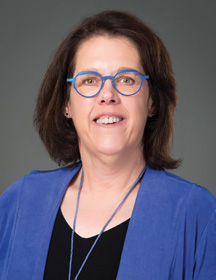Dr. Beth Longenecker was hired as the founding dean of UNC’s proposed College of Osteopathic Medicine after a national search. She started her position in June.
For the past three years, Longenecker served as the dean of the Ohio University Heritage College of Osteopathic Medicine. Prior to that, she was the associate dean of Clinical Education at Midwestern University’s Chicago College of Osteopathic Medicine (2015-19) and the associate dean of Clinical Sciences at William Carey University’s College of Osteopathic Medicine (2013-15). In previous roles Longenecker served as a program director of the Emergency Medicine Residency at Mount Sinai Medical Center and the Miami Heart Institute and program director of the Emergency Medicine Residency at St. Barnabas Hospital in Bronx, New York.
As founding dean of UNC-COM, Longenecker will lead the medical college through development, accreditation and on to the goal of becoming a world-class center of medical education.

Beth Longenecker, Dean, College of Osteopathic Medicine
We caught up with Longenecker to ask her about her thoughts on health care and her vision for the UNC College of Osteopathic Medicine.
Q: What excites you most about your new role at UNC and the College of Osteopathic Medicine?
It was clear to me from the start of the interview process that UNC focuses on the success of both their students and their community. This resonates with my personal values as a physician and educator. It creates the perfect environment to model compassion and community engagement for the next generation of osteopathic physicians.
In addition, Colorado currently faces a physician shortage, especially in primary care. More than 50% of osteopathic graduates enter primary care specialties. In national surveys, one-third of osteopathic medical students expressed a desire to work in rural and underserved communities. Opening a new college of osteopathic medicine at UNC provides an opportunity to significantly impact care provided to Coloradans and others in the region.
Q: What advantages will UNC’s COM have to make it stand out among others?
There are many aspects of UNC that will allow us to develop a unique and special college. Most osteopathic medical schools are housed in private non-profit and a few in for-profit universities. UNC COM will be only the eighth college located within a public university.
There is a need to increase diversity in the medical profession. While increasing numbers of Black and Hispanic students are entering medical school these numbers still need to increase. The American Medical Association recognizes that racial and ethnic diversity among health professionals positively impacts access to care and the quality of care provided to underserved populations. UNC’s commitment to diversity provides a foundation to develop programs targeting mentorship and recruitment of underrepresented minority medical students.
In addition, UNC has well-established programs in the health professions and there is a true desire to create opportunities for interprofessional educational and practical experiences across these fields.
Q: You’ve had a great deal of experience with existing colleges of osteopathic medicine. What are some key lessons you’ve learned in those roles that you hope to apply in creating UNC’s COM?
Three things stand out to me in my experience both as a teacher/administrator and as an accreditation site inspector.
First, the most successful colleges of osteopathic medicine focus on student success and create systems to support their students. Such efforts include robust systems of advising, and early identification of students who are facing academic challenges combined with resourcing to provide additional help from peer mentors to specialists in educational strategies.
Second, these colleges focus on mental health and well-being and provide access to mental health counseling and seek ways to boost morale during high stress times throughout the semester.
Lastly, the focus on curriculum in a medical school needs to be about learning and clinical reasoning, not lecturing and teaching by rote. Medical students need to develop critical thinking skills and need to be able find and assess the most up-to-date information to care for their patients.
The best methods for preparing them are not lecture heavy. Rather, using case-based curricula that create space for students to find information and generate conclusions, to work in a team and to get hands-on experience from the start both through simulation and exposure to clinical situations best prepares students for their role in caring for patients.
Q: Is there anything else about UNC, the College of Osteopathic Medicine, your role or healthcare in Northern Colorado that you think readers might find interesting or informative?
In creating a strategy, I like to think toward the future.
In 10 years, many of our first graduates will be completing their residency training. At that time, when people talk about UNC-COM, I’d like to hear them say that we graduate amazing doctors, and we want them to take care of our family. I want our clinical partners to seek our graduates to join their medical practices and hospital staff. I want to see our graduates enter primary care and other needed specialties and return to Colorado and the surrounding regions to practice. I would love for UNC to be recognized as a center for interprofessional excellence in health professions education.

